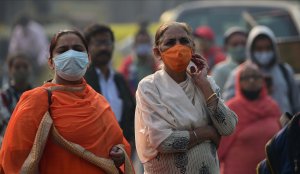March 19 (UPI) — Travelers with breathing issues might want to avoid India, Pakistan and Bangladesh, which have the highest levels of air pollution globally, according to a new report.
All three countries were found to have more than 10 times the World Health Organization annual guideline for exposure to fine particulate matter, which includes dust, soot and smoke.
On Tuesday, Swiss technology company IQAir released the 2023 World Air Quality Report, which revealed that only seven of the 134 countries surveyed met the WHO guideline — Australia, Estonia, Finland, Grenada, Iceland, Mauritius and New Zealand.
In 2022, WHO tightened its air quality guideline for annual fine particulate matter, citing global health considerations.
According to the U.S. Environmental Protection Agency, air pollution is especially toxic to children, pregnant women, older adults and people with pre-existing heart and lung disease.
People in low socioeconomic communities tend to be more vulnerable to particle or soot pollution, which has been linked to a range of serious and sometimes deadly illnesses.
Topping the list of countries with the “worst air pollution” in the IQAir study were Bangladesh, Pakistan, India, Tajikistan and Burkina Faso.
The report also found polluted air concentrations rose in almost every country in Southeast Asia, with the region of Central and South Asia being home to the Top-10 most polluted cities in the world.
Stateside, the study found Columbus, Ohio, and Beloit, Wis., were the most polluted cities in America. Las Vegas was the cleanest.
In a statement, IQAir CEO Frank Hammes said in many parts of the world the “lack of air quality data delays decisive action and perpetuates unnecessary human suffering.”
Hammes told CNN that no significant improvement is likely without “major changes in terms of the energy infrastructure and agricultural practices.”
“What’s also worrisome in many parts of the world is that the things that are causing outdoor air pollution are also sometimes the things that are causing indoor air pollution,” he said. “So cooking with dirty fuel will create indoor exposures that could be many times what you’re seeing outdoors.”
According to a World Bank study in 2022, air pollution caused about 78,145 to 88,229 deaths in Bangladesh in 2019. There, breathing the air is equivalent to smoking about 1.7 cigarettes per day. From 2018 to 2021, Dhaka was ranked as the second-most polluted city in the world.

COMMENTS
Please let us know if you're having issues with commenting.